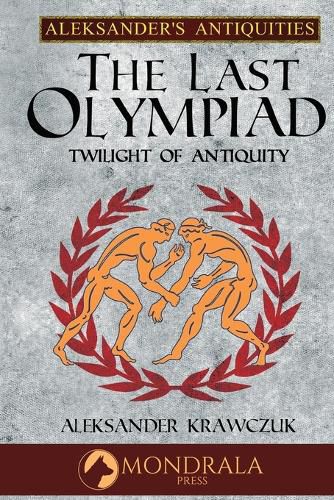Readings Newsletter
Become a Readings Member to make your shopping experience even easier.
Sign in or sign up for free!
You’re not far away from qualifying for FREE standard shipping within Australia
You’ve qualified for FREE standard shipping within Australia
The cart is loading…






This title is printed to order. This book may have been self-published. If so, we cannot guarantee the quality of the content. In the main most books will have gone through the editing process however some may not. We therefore suggest that you be aware of this before ordering this book. If in doubt check either the author or publisher’s details as we are unable to accept any returns unless they are faulty. Please contact us if you have any questions.
The Serapeum destroyed, the emperor murdered, pagans raise a revolt!
The best-selling European author of books on Greaco-Roman antiquity paints a rich and highly readable panorama of the intellectual life of the Roman Empire of the period of the Last Olympic Games of antiquity (AD389-AD393). Here they are, debating topics ranging from the moral consequences of bathing and chariot races to national character and demon possession:
the zany, crafty, and weird doctors of the Church: Ambrose, Jerome, and Augustine the dyspeptic historian Ammianus Marcellinus three fanatic historians of the Church the grumpy rhetorician Libanius the blood-thirsty pagan scholar-defenders of the Alexandrian Serapeum the author of a rabid anti-Christian diatribe which somehow miraculously survived to our times (The Lives of Sophists) and the quirky and mysterious figure of "Jorge Luis Borges of ancient Rome" (Authors of Imperial History)
Aleksander Krawczuk (1922-2023) was a scholar, a professor at the Jagiellonian University, a minister of culture, and a best-selling European author of books on Graeco-Roman antiquity with an international cult following. His intimate and conversational style allowed him to talk about complicated subjects in an accessible way without dumbing them down in the process. His books remain in print in many languages across Europe. And now they finally appear in English.
$9.00 standard shipping within Australia
FREE standard shipping within Australia for orders over $100.00
Express & International shipping calculated at checkout
This title is printed to order. This book may have been self-published. If so, we cannot guarantee the quality of the content. In the main most books will have gone through the editing process however some may not. We therefore suggest that you be aware of this before ordering this book. If in doubt check either the author or publisher’s details as we are unable to accept any returns unless they are faulty. Please contact us if you have any questions.
The Serapeum destroyed, the emperor murdered, pagans raise a revolt!
The best-selling European author of books on Greaco-Roman antiquity paints a rich and highly readable panorama of the intellectual life of the Roman Empire of the period of the Last Olympic Games of antiquity (AD389-AD393). Here they are, debating topics ranging from the moral consequences of bathing and chariot races to national character and demon possession:
the zany, crafty, and weird doctors of the Church: Ambrose, Jerome, and Augustine the dyspeptic historian Ammianus Marcellinus three fanatic historians of the Church the grumpy rhetorician Libanius the blood-thirsty pagan scholar-defenders of the Alexandrian Serapeum the author of a rabid anti-Christian diatribe which somehow miraculously survived to our times (The Lives of Sophists) and the quirky and mysterious figure of "Jorge Luis Borges of ancient Rome" (Authors of Imperial History)
Aleksander Krawczuk (1922-2023) was a scholar, a professor at the Jagiellonian University, a minister of culture, and a best-selling European author of books on Graeco-Roman antiquity with an international cult following. His intimate and conversational style allowed him to talk about complicated subjects in an accessible way without dumbing them down in the process. His books remain in print in many languages across Europe. And now they finally appear in English.